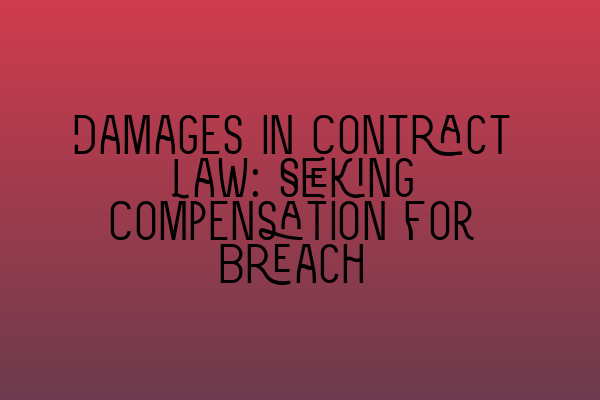Damages in Contract Law: Seeking Compensation for Breach
When entering into a contract, parties expect that the terms will be upheld and the agreed-upon obligations will be fulfilled. However, there are times when one party fails to perform their duties, resulting in a breach of contract. In such cases, the injured party may seek damages as a means of compensation.
In contract law, damages are a monetary sum awarded to the non-breaching party to restore them to the position they would have been in had the breach not occurred. Understanding the different types of damages and the principles behind seeking compensation is crucial for anyone involved in contract law. In this article, we will explore the various types of damages and the factors considered when calculating them.
Types of Damages
There are several types of damages that can be claimed in contract law:
- Compensatory Damages: Compensatory damages are the most common type of damages awarded in contract breach cases. They aim to place the injured party in the position they would have been in if the contract had been performed correctly. This may include direct and foreseeable losses, such as financial loss or damage to property.
- Consequential Damages: Consequential damages, also known as special damages, are losses that are not directly caused by the breach, but are a result of the breach and are reasonably foreseeable. For example, if a construction contractor breaches a contract to build a house, the consequential damages may include the homeowner’s costs for alternative housing during the delay.
- Nominal Damages: Nominal damages are symbolic damages awarded when there has been a breach of contract, but no actual financial loss has occurred. They are typically a small token amount, such as £1, and are awarded to acknowledge the breach and affirm the injured party’s rights.
- Liquidated Damages: Liquidated damages are pre-determined damages specified in the contract itself. They are agreed upon by the parties at the time of contract formation as a reasonable estimate of the damages that would occur in the event of a breach. Liquidated damages are enforceable if they represent a genuine pre-estimate of the likely loss.
- Punitive Damages: Unlike compensatory damages, punitive damages are not intended to compensate the injured party, but rather to punish the breaching party for their wrongful conduct. However, punitive damages are rarely awarded in contract law cases unless the breach also involves fraud or other malicious intent.
Factors in Calculating Damages
When calculating damages, the court considers various factors to ensure a fair and reasonable outcome:
- Type of Breach: The severity and nature of the breach are important factors in determining the damages. A minor breach, also known as a partial breach, may result in reduced damages compared to a material breach, where the breaching party fails to perform a significant part of the contract.
- Foreseeability: Damages must be reasonably foreseeable at the time of contract formation to be recoverable. If the damages were not reasonably foreseeable, the injured party may not be entitled to compensation.
- Mitigation: The injured party has a responsibility to mitigate their damages. This means taking reasonable steps to minimize the loss suffered as a result of the breach. Failure to mitigate damages can reduce the amount of compensation awarded.
- Causation: The breach must be the direct cause of the damages claimed. It is essential to establish a clear causal link between the breach and the losses suffered.
Conclusion
In contract law, damages are the primary means of seeking compensation for a breach of contract. Various types of damages may be awarded depending on the circumstances of the breach, and the calculation of damages takes into account factors such as the type of breach, foreseeability, mitigation, and causation. Understanding the principles and concepts behind damages in contract law is essential for both legal professionals and individuals involved in contracts.
